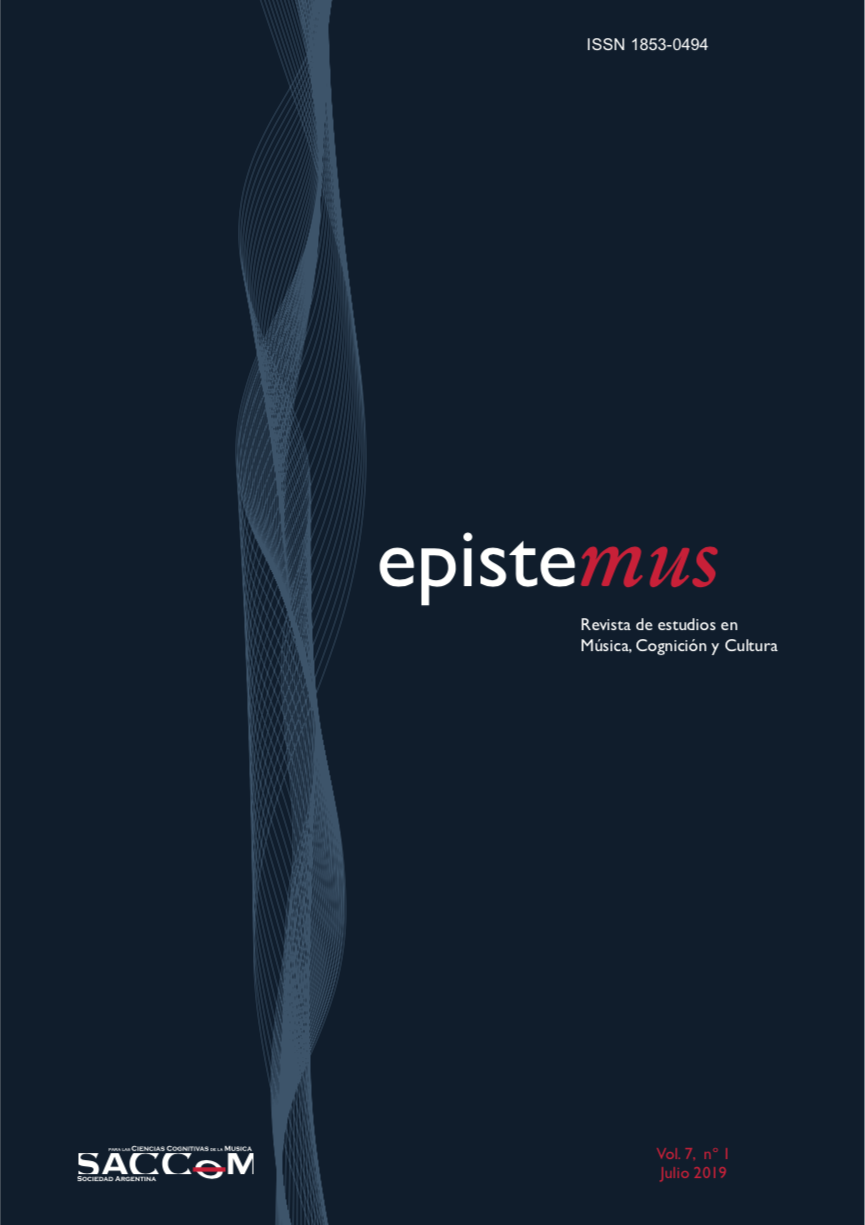Elements of perception theory in Pierre Souvtchinskyʼs musicology
The principle of unfolding and concentration in Igor Stravinsky
DOI:
https://doi.org/10.24215/18530494e001Keywords:
Souvtchinsky, Stravinsky, time, unfolding, concentrationAbstract
In his most outstanding musical writings, Pierre Souvtchinsky alludes in various ways to a mechanism of unfolding and concentration in the perceptual field. These concepts and the reflection on musical time (chronos), a central issue in the philosopher, appear in a particular way in his texts dedicated to Igor Stravinsky. Considering, among others, some partially unpublished source, in the first part of this article is exposed and analyzed this mechanism, until now unexplored in the thinking of Souvtchinsky. Trying to articulate these concepts and the way in which the philosopher approaches the music, the musical time and the figure of the composer, in the second part is proposed its application to illuminate some peculiarities of Stravinsky's musical thought. Finally, pondering the possible categorization of this mechanism as a structural principle of perception, we suggest the hypothesis that it can be an appropriate tool for the analysis of a musical thought.
Downloads
Metrics
References
Adorno, Th. W. (2003). Filosofía de la Nueva Música (Alfredo Brotons, trad.). Madrid: Akal.
Ansermet, E. (2000). Escritos sobre la música. (Ana García, trad.). Barcelona: Idea Books.
Ares Yebra, J. (2014). El manuscrito de Souvtchinsky y la Poética musical: sobre el con- cepto de tiempo en el pensamiento estético de Igor Stravinsky. En Yolanda Espiña & Miguel Ribeiro-Pereira (Coord.) Cadernos de Teoría das Artes. Arte & Teoría. (pp. 95-120). Porto: Universidade Católica Editora.
Ares Yebra, J. (2017). Pierre Souvtchinsky: desdoblamiento y concentración en Igor Stravinsky. Fuentes y elementos para una propuesta. PhD. diss., Universidade de Vigo.
Ares Yebra, J. (2018). Pensar la música. Fuentes y elementos para una propuesta en Pierre Souvtchinsky. Revista del Instituto de Investigación Musicológica Carlos Vega, no 32, 15-43.
Bergson, H. (1999). Ensayo sobre los datos inmediatos de la conciencia. (Juan Miguel Palacios, trad.). Salamanca: Sígueme. (Obra original publicada en 1888).
Boucorechliev, A. (1968). Stravinsky un et multiple. En Stravinsky. Paris: Hachette, 149- 173.
Brelet, G. (1947). Esthétique et création musicale. Paris: Editorial Universitaires de France. Brelet, G. (1948). Tempo musical et tempo. Polyphonie. Deuxième Cahier. Le Rythme musical, 12-26.
Danuser, H., Zimmermann, H. (Ed.) (2013). Avatar of Modernity. The Rite of Spring reconsidered. London: Boosey y Hawks.
De Volder, P. (1998). Encuentros con Luis de Pablo. Madrid: Fundación Autor.
Dufour, V. (2003). La “Poétique musicale” de Stravinsky. Un manuscrit inédit de Sou- vtchinsky. Revue de Musicologie, T. 89(2), 373-392.
Dufur, V. (2004). Stravinsky vers Souvtchinsky. Thème et variations sur la Poétique musi- cale. Mitteilungen der Paul Sacher Stiftung, Vol. 17, 17-23.
Gombau, G. (2006). Estética y música. Edición, introducción y notas de Antonio Notario Ruiz, Salamanca: Fundación Salamanca Ciudad de Cultura.
Emery, E. (1975). Temps et musique. Lausanne: L’Age d’Homme.
Han, Byun-Chul (2015). El aroma del tiempo. Un ensayo sobre el arte de demorarse (Paula Kuffer, trad.). Barcelona: Herder.
Humbertclaude, É.(1990). (Re)lire Souvtchinski. La Bresse.
Husserl, E. (2002). Lecciones de fenomenología de la conciencia interna del tiempo. Traducción, introducción y notas de Agustín Serrano de Haro. Madrid: Trotta. (Obra original publicada en 1928).
Laló, Ch. (1927). Bosquejo de una estética musical científica (José Ontañón, trad.). Ma- drid: Daniel Jorro.
Levidou, K. (2011). The artist-genius in Petr Suvchinskii’s eurasianist philosophy of his- tory: The case of Igor Stravinsky. The Slavonic and East European Review, Vol. 89( 4), pp. 601-629.
Messiaen, O. (1939). Le rythme chez Igor Strawinsky. La Revue Musicale, Vol.191, pp. 91–92.
Roland-Manuel, A. (1939). Carta a Souvtchinsky, 7 de junio (L.S.).
Schloezer, B. de (1929). Igor Stravinsky. Paris: Éditions Claude Aveline.
Souvtchinsky, P. (1922). A propos de la mort d’A. Nikisch. En (Re)lire Souvtchinsky (Éric Humbertclaude, ed.). La Bresse, 1990, 17-20.
Souvtchinsky, P. (1922). Notes sur la musique. En (Re)lire Souvtchinsky (Éric Humbert- claude, ed.). La Bresse, 1990, 237-245.
Souvtchinsky, P. (1930). Le “Strawinsky” de Igor Glebov. Musique, Revue mensuelle de critique, no. 6, 250-253.
Souvtchinsky, P. (1939). Reflexiones sobre la tipología de la creación musical. La noción del tiempo y la música. Sur, no. 55, 88-98.
Souvtchinsky, P. (1939). La Notion du Temps et la Musique. Réflexions sur la typologie de la création musicale. La Revue Musicale, no. 191, 70-81.
Souvtchinsky, P. (1945 [?]). Extrait de “Poetique Musicale”, chapitre II “Du Phénomène Musicale” (La Flûte de Pan). J.B.Janin Editeur. Mecanografiado en francés, 1 página, inédito, (L.S.).
Souvtchinsky, P. (1954). A propos d’un retard. La musique et ses problémes contempo- rains. Cahiers de la Compagnie Madeleine Renaud–Jean-Louis Barrault. París: Julliard, 121-127.
Souvtchinsky, P. (1958). Zeit und Musik. Zur Typologie des musikalischen Schaffens. Musik der Zeit, Strawinsky: Wirklichkeit und Wirkung. Bonn: Boosey y Hawkes, 1-12.
Souvtchinsky, P. (1962). Le miracle du Sacre du Printemps (Tradition et inspiration). Parcialmente inédito (L.S.), mecanografiado en francés, 8 hojas. Traducción parcial al alemán: “Das wunder des Sacre du Printemps”. Conferencia leída en la Radio de Colonia, Geburtstag, WDR, emisión Stravinsky-Zyklus, 2 de febrero.
Souvtchinsky, P. (1971). Quatre paragraphes. (Re)lire Souvtchinsky. En (Re)lire Souvtchinsky (Éric Humbertclaude, ed.). La Bresse, 1990, 21-31.
Souvtchinsky, P. (1982). Stravinsky auprès et au loin. Neuf paragraphes. Stravinsky. En Stravinsky. Études et témoignages (François Lesure, éd.) París: Lattès, 15-52. (Texto original escrito en 1975).
Souvtchinsky, P. (1976). Quelques remarques pour le projet d’un “Centre d’etudes Igor Stravinsky”. Mecanografiado en francés, 2 páginas. Inédito (L.S.).
Souvtchinsky, P. (2004). Un siècle de musique russe (1830-1930). Glinka, Mousorgsky, Tchai-kowsky, Strawinsky. (Frank Langlois, ed.). Arles: Actes Sud. (Obra original escrita en 1944/1945).
Stravinsky, I. (1942). Poetique musicale sous forme de six leçons. Cambridge, Massachusetts: Harvard University Press.
Stravinsky, I. (2005). Crónicas de mi vida ( Elena Vilallonga Serra, trad.). Barcelona: Alba. (Obra original publicada en 1935).
Stravinsky, I. (2011). Poétique musicale. Edición establecida, presentada y anotada por Myriam Soumagnac. Paris. Flammarion.
Stumpf, C. (2012). The origins of music (David Trippett, trad.). Oxford: Oxford University Press. (Obra original publicada en 1911).
Downloads
Published
How to Cite
Issue
Section
License
Politica vigente desde octubre de 2019
La aceptación del manuscrito por parte de la revista implica la cesión no exclusiva de los derechos patrimoniales de los/as autores/as en favor del editor, quien permite la reutilización, luego de su edición (postprint), bajo una Licencia Creative Commons Atribución-NoComercial-CompartirIgual 4.0 Internacional (CC BY-NC-SA 4.0)
Acorde a estos términos, el material se puede copiar y redistribuir en cualquier medio o formato siempre que a) se cite la autoría y la fuente original de su publicación (revista y URL de la obra), se brinde el acceso a la licencia y se indique si se realizaron cambios; b) no se utilice el material para fines comerciales.
La cesión de derechos no exclusivos implica que luego de su edición (postprint) en Epistemus los/as autores/as pueden publicar su trabajo en cualquier idioma, medio y formato; en tales casos, se solicita que se consigne que el material fue publicado originalmente en esta revista.
Tal cesión supone, también, la autorización de los/as autores/as para que el trabajo sea cosechado por SEDICI, el repositorio institucional de la Universidad Nacional de La Plata, y sea difundido en las bases de datos que el equipo editorial considere adecuadas para incrementar la visibilidad de la publicación y de sus autores/as.
Asimismo, la revista incentiva a los/as autores/as para que luego de su publicación en Epistemus depositen sus producciones en otros repositorios institucionales y temáticos, bajo el principio de que ofrecer a la sociedad la producción científica y académica sin restricciones contribuye a un mayor intercambio del conocimiento global.

















